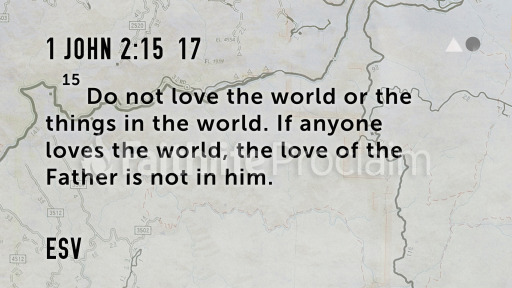Love God, not the World

Main Idea: Love God and not the world because God leads to life and the world leads to death
1. What is the world?
the moral and spiritual impulses that determine how people live.
2. What is Love?
3. What does loving God rather than the world look like?
Preachers have the reputation of railing against society’s evils by identifying specific behaviors that are destructive and sinful—things such as drunkenness, addictions, or sexual immorality. While it is true those behaviors are not of God, John’s thinking in this passage strikes at a much deeper level. The three evils he lists are not to be narrowed to three specific vices—as if “the desire of the flesh” was all about illicit sex and pornography—but John insists instead that we question the reigning value system of all of contemporary life at its roots. It is not enough to say that sexual immorality is wrong, or that pride is wrong, or that we must not covet material possessions. While all that is true, they are only symptoms of the much deeper problem of “the world’s” alienation from God. All human values, ethics, and morality that are defined by fallen people are fatally flawed because they are built on false premises about reality.
People who reject the knowledge that “God is light” reject God’s sovereign prerogative to define the standard of human values and morality. Even if not an atheist at the philosophical level, anyone who rejects God’s rule of life in some aspect of their behavior is to that extent an atheist in practice. The underlying problem is a radical autonomy of the human spirit that insists on being its own god. And the result is each person “doing what is right in their own eyes” (cf. Judg 21:25) in a world that no longer has a uniform basis for law and morality. That is the way of “the world” as John uses the term.